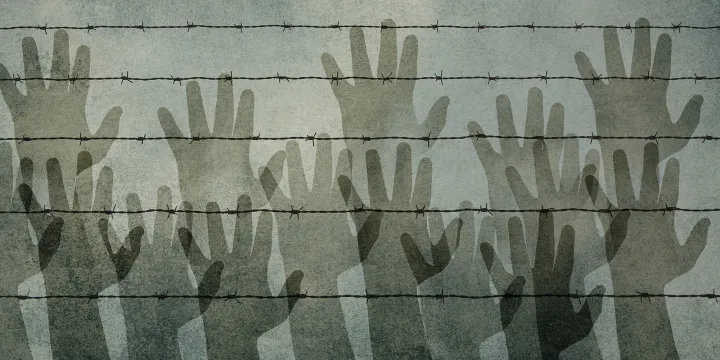BREAK THE CHAINS OP-ED
Financial intelligence key to addressing the continuing threat of modern slavery in Africa

The finance sector must improve its capacities to identify, monitor, and report suspicious transactions. Data runs through the entire process of addressing modern slavery and human trafficking — from identification to remedy — but it needs to be translated into actionable financial intelligence.
The Covid-19 pandemic has exposed the deep and entrenched inequality of our economic systems. One extremely worrying consequence has been a sharp rise in the number of victims of human trafficking and modern slavery — an increase of approximately 10 million worldwide since 2017.
We are clearly backsliding in our efforts to attain Target 8.7 of the UN’s Sustainable Development Goals (to end modern slavery) and protect vulnerable individuals and communities. This includes many Africans: of the 49.6 million victims worldwide, seven million live on the continent.
The problem is not only one borne by victims and their families; when billions of dollars are diverted illicitly, Africa’s economies also suffer. Without a solution, we fear that in addition to the trauma and indignity that victims are forced to endure, the continent may never reach its full economic potential.
Mobilising the financial sector
The financial sector is critical to any long-term solution. Finance serves as a major stimulus for traffickers and slavers; it’s an important source of leverage through which investors can influence businesses; and financial exclusion — limited access to and usage of appropriate and affordable financial products — enhances vulnerabilities to modern slavery and human trafficking risks.
Mobilising the financial sector to act was the focus of a conference in Cape Town in early December 2022. FAST: Convening Africa was hosted by the United Nations University Centre for Policy Research’s Finance Against Slavery and Trafficking (Fast) initiative and the South African Anti-Money Laundering Integrated Task Force (Samlit). The event brought together diverse partners — including survivors, banks, investors, civil society organisations, and trade unions — to share knowledge, identify best practices, and propose solutions.
The event, which amplified survivor voices and reflected on their experiences, helped consolidate thinking on a new approach to address human trafficking and modern slavery risks: collaboration and efforts to build cross-sectoral coalitions; investors engaging their investees via due-diligence processes, Environment, Social and Governance (ESG) reporting, and more active ownership; providing remedy to survivors beyond monetary compensation — including support to reintegrate and acknowledging trauma; global knowledge exchange between different stakeholders; and mainstreaming financial inclusion.
Visit Daily Maverick’s home page for more news, analysis and investigations
Enhancing collaboration and knowledge exchange
Public-Private Partnerships (PPPs) bring together government bodies and financial institutions and accelerate efforts to identify trafficking networks and disrupt the flow of their finances. A successful model that other African countries can follow is Samlit. Its expert working group on modern slavery and human trafficking is increasing awareness of human trafficking-related financial flows and developing indicators that can help the financial sector identify suspicious activities.
The finance sector must also improve its capacities to identify, monitor, and report suspicious transactions. Data runs through the entire process of addressing modern slavery and human trafficking — from identification to remedy — but it needs to be translated into actionable financial intelligence.
Risk assessments, for instance, help countries and financial institutions to better understand the nature of money laundering risks and transactions associated with human trafficking and modern slavery. Using qualitative data can also help to capture the lived experiences of survivors — helping to ensure survivor perspectives are reflected in the design and implementation of solutions.
Encouraging responsible investments
Investors are key drivers of sustainability reporting and transparent capital markets and can help advance knowledge and expertise to assess and address modern slavery risk in business operations and supply chains.
Although responsible investment puts the onus on investors and financial institutions to consider the risks their investments pose, its potential may depend on due-diligence guidance, effective ESG reporting, and building investee capacities to provide safe and humane working conditions.
Promisingly, we are seeing more development finance institutions and commercial banks perceive “remedy” to be central to their “do no harm” objectives. However, while modern slavery victims are entitled to remedy under international law, they often lack access to effective remedial mechanisms; and even when they do have access, these processes rarely lead to positive outcomes.
In response, Fast: Convening Africa offered several promising solutions, ranging from strengthening grievance and dispute resolution mechanisms to building capacity for remedial actions and allowing community NGOs to review investment proposals for potential adverse impacts
Securing financial inclusion
Finally, we need to expand financial inclusion and develop tailored financial products that can enable vulnerable populations and survivors to access and use essential services. Helping vulnerable people to become — and remain — part of the formal economy not only protects them against situations like debt bondage; experience tells us it can also support job creation, spur entrepreneurship, and propel economic growth.
The acceleration of digital financial services and products during the Covid-19 pandemic offers a unique opportunity to bridge the digital divide and increase financial inclusion; although safeguards such as data protection and financial and digital literacy training will also be needed.
We have been appalled by the recent rise in human trafficking and modern slavery. But our discussions last week centred on survivor voices and recommendations, provided the clarity needed to develop a holistic and sustainable response. We must now act to address vulnerability, support survivors, and build prosperity for all. DM
Advocate Xolisile Khanyile is Director of South Africa’s Financial Intelligence Centre and Chair of the Samlit Steering Committee.
Daniel Thelesklaf is Project Director of Finance Against Slavery and Trafficking, United Nations University Centre for Policy Research.



















 Become an Insider
Become an Insider
Comments - Please login in order to comment.